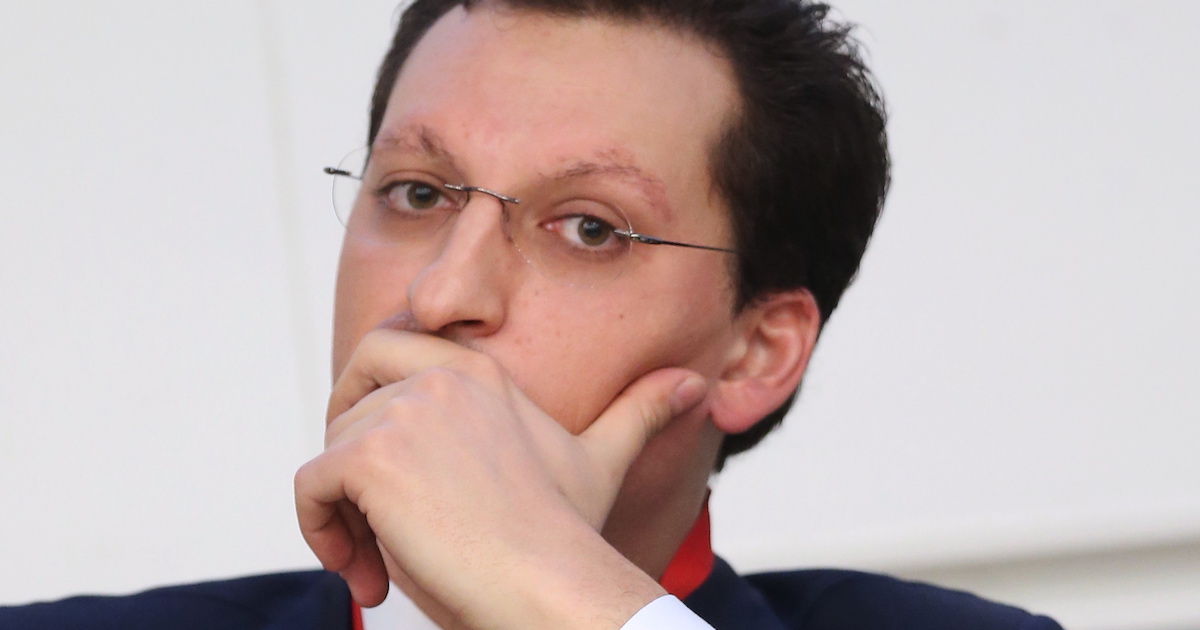
Vladimir Putin’s daughter breaks up with billionaire husband
Four most important stories on Russia this week

Photo: TASS
1. Vladimir Putin’s daughter breaks up with billionaire husband
What happened
The news of the week for the Russian elite, reported by Bloomberg on Thursday: Vladimir Putin’s daughter Katerina Tikhonova and Kirill Shamalov, a top executive at one of the country’s largest petrochemichal companies Sibur, are no longer married. Shamalov, the son of Putin’s old friend, married Tikhonova in 2013, and since then has become Russia’s youngest billionaire.
- Kirill Shamalov’s father Nikolay was one of Vladimir Putin’s closest friends in the 1990s. Further, he has built up a significant, but not grand business in Russia, and was sanctioned by the European Union (but not by the U.S.) in 2014.
- Shamalov Jr. and Tikhonova’s wedding party was held at another Putin’s friend private ski resort near St.Petersburg and was described by Reuters as a celebration where “no expense was spared and everyone was sworn to secrecy”.
- By the time of the wedding, Shamalov Jr., then 31, was vice-president of Sibur and had a 4.3% share in the $10-billion company after a management buyout. In 2014, he has bought another 17%, worth $1.7 billion with a friendly loan from Gazprombank, which is partly state-owned, but in fact controlled by the friends of Putin’s family.
- In May 2017, Shamalov has suddenly sold his Sibur stake to the major owner of the company Leonid Mikhelson. According to Vedomosti (Russian), the whole operation brought him $100 million, and according to Bloomberg, he earned nothing, having been no more than a family trustee, that had to pass over his stake after having left the family.
Why the world should care
The story of Shamalov and Tikhonova gives an understanding of how money is distributed in Russia, and of the part of Vladimir Putin’s family&friends in the Russian economy.
2. Russian officials at WEF reveal anxiety about new U.S. sanctions
What happened
With the new sanctions pending, Russian officials and business executives had to spend much of the World Economic Forum in Davos answering questions, rather than advertising the country’s rising economy.
- The highest ranked Russian delegate, Vice Premier Arkady Dvorkovich, said that the Americans were hiding and don’t want to talk to the Russians.
- The most sincere one was Andrey Kostin, the CEO of second largest Russian bank VTB (its shares have fallen 3 times since the 2007 IPO). The West is trying to change power in Russia in an economic war, and the new sanctions will be no less than a war declaration, Kostin said. He assumed that Russia should even recall the ambassador form Washington.
- Kostin is as good as it gets to speak for the modern Russian elite, a former Soviet diplomatic staff in London in the 1980s, when most Russians couldn’t even think of travelling abroad, and then a top government-owned bank executive since the beginning of the 1990s.
- The reason is the January, 29 deadline, when the U.S. Treasury is to send to Congress the list of Russian “oligarchs” deemed close to Kremlin, which will become a basis for future sanctions against Russia.
Why the world should care
The blacklist will largely define further relations between Russia and the U.S. in 2018.
3. Russian people of force fight for their properties with former partners and reporters
What happened
These two Russian news headlines are at first sight not linked, but they have something in common. First, as The Bell reported (Russian) this week, an imprisoned, allegedely corrupt businessman Dmitry Mikhalchenko has given away his ⅓ share of a port facility near St.Petersburg to his former patrons in the Federal Protective Service, the personal security service of the Russian president. Second, on the very same day, a small but independent website Russiangate was shut down after reporting (Russian) on concealed property of the head of the most influential security agency, the Federal Security Service (FSB).
Why the world should care
If you consider business in Russia, mind that the support of the people close to the security services may be efficient at the beginning, but then it would be pricey.
4. Financial loss and government pressure: Russian media face tough challenges in 2018
What happened
Independent media in Russia are few, and they have started 2018 with less room to maneuver than in 25 years. The Bell’s founder Elizaveta Osetinskaya highlights 4 most important Russian media trends in an op-ed for The Moscow Times.
- The government extends its reach. New legislation has given the government the right to brand any “unfriendly” media organization (or even individuals) that receive funding from outside Russia as “foreign agents”. However, Russia is still far from establishing a national firewall as the Chinese, and decisions based on these new laws will be made on a case-by-case basis, greatly depending on Russia’s confrontation with the West.
- Traditional media will struggle for profits. The newspapers and glossy magazines will continue to either teeter on the edge of profitability or incur losses. Big online outlets are likely to finally lose the battle for public attention to major tech companies like Facebook, YouTube, Instagram and Google.
- Being creative in social media is as essential as ever. New online platforms such as Telegram, an encrypted messaging app which has become a popular news source in 2017, present a huge opportunity for independent journalists in Russia, as there are no design, development or support costs.
- Finding a niche may be a way to survive. The Russian media have little choice of viable strategies given the limited resources and constant pressure from the government. We follow two: to find a niche and to focus on the specific needs of our audience, and to publish fewer, but more targeted, news stories.
Why the world should care
Russia will still be in the news throughout 2018, and the world will need reliable news sources on the Russian side.
Peter Mironenko, The Bell editor




